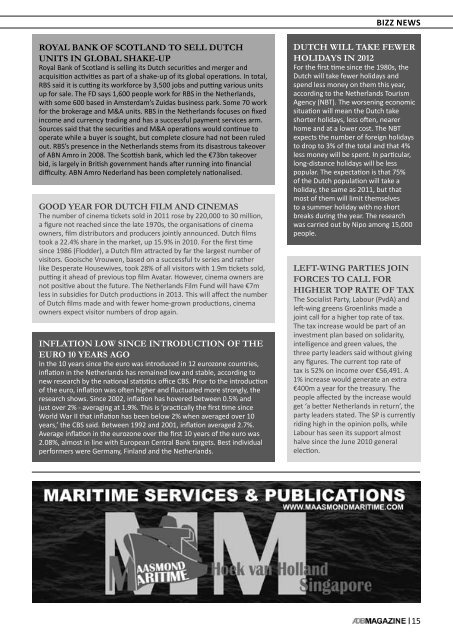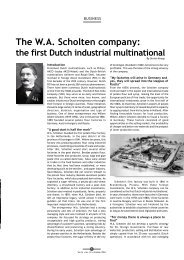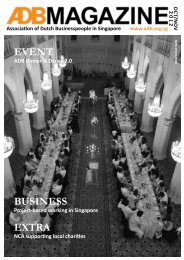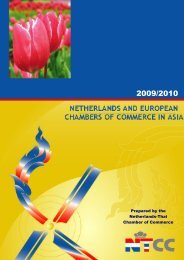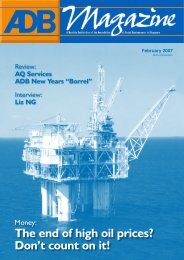February 2012 - Association of Dutch Businessmen
February 2012 - Association of Dutch Businessmen
February 2012 - Association of Dutch Businessmen
You also want an ePaper? Increase the reach of your titles
YUMPU automatically turns print PDFs into web optimized ePapers that Google loves.
Bizz News<br />
Royal Bank <strong>of</strong> Scotland to sell <strong>Dutch</strong><br />
units in global shake-up<br />
Royal Bank <strong>of</strong> Scotland is selling its <strong>Dutch</strong> securities and merger and<br />
acquisition activities as part <strong>of</strong> a shake-up <strong>of</strong> its global operations. In total,<br />
RBS said it is cutting its workforce by 3,500 jobs and putting various units<br />
up for sale. The FD says 1,600 people work for RBS in the Netherlands,<br />
with some 600 based in Amsterdam’s Zuidas business park. Some 70 work<br />
for the brokerage and M&A units. RBS in the Netherlands focuses on fixed<br />
income and currency trading and has a successful payment services arm.<br />
Sources said that the securities and M&A operations would continue to<br />
operate while a buyer is sought, but complete closure had not been ruled<br />
out. RBS’s presence in the Netherlands stems from its disastrous takeover<br />
<strong>of</strong> ABN Amro in 2008. The Scottish bank, which led the €73bn takeover<br />
bid, is largely in British government hands after running into financial<br />
difficulty. ABN Amro Nederland has been completely nationalised.<br />
Good year for <strong>Dutch</strong> film and cinemas<br />
The number <strong>of</strong> cinema tickets sold in 2011 rose by 220,000 to 30 million,<br />
a figure not reached since the late 1970s, the organisations <strong>of</strong> cinema<br />
owners, film distributors and producers jointly announced. <strong>Dutch</strong> films<br />
took a 22.4% share in the market, up 15.9% in 2010. For the first time<br />
since 1986 (Flodder), a <strong>Dutch</strong> film attracted by far the largest number <strong>of</strong><br />
visitors. Gooische Vrouwen, based on a successful tv series and rather<br />
like Desperate Housewives, took 28% <strong>of</strong> all visitors with 1.9m tickets sold,<br />
putting it ahead <strong>of</strong> previous top film Avatar. However, cinema owners are<br />
not positive about the future. The Netherlands Film Fund will have €7m<br />
less in subsidies for <strong>Dutch</strong> productions in 2013. This will affect the number<br />
<strong>of</strong> <strong>Dutch</strong> films made and with fewer home-grown productions, cinema<br />
owners expect visitor numbers <strong>of</strong> drop again.<br />
Inflation low since introduction <strong>of</strong> the<br />
euro 10 years ago<br />
In the 10 years since the euro was introduced in 12 eurozone countries,<br />
inflation in the Netherlands has remained low and stable, according to<br />
new research by the national statistics <strong>of</strong>fice CBS. Prior to the introduction<br />
<strong>of</strong> the euro, inflation was <strong>of</strong>ten higher and fluctuated more strongly, the<br />
research shows. Since 2002, inflation has hovered between 0.5% and<br />
just over 2% - averaging at 1.9%. This is ‘practically the first time since<br />
World War II that inflation has been below 2% when averaged over 10<br />
years,’ the CBS said. Between 1992 and 2001, inflation averaged 2.7%.<br />
Average inflation in the eurozone over the first 10 years <strong>of</strong> the euro was<br />
2.08%, almost in line with European Central Bank targets. Best individual<br />
performers were Germany, Finland and the Netherlands.<br />
<strong>Dutch</strong> will take fewer<br />
holidays in <strong>2012</strong><br />
For the first time since the 1980s, the<br />
<strong>Dutch</strong> will take fewer holidays and<br />
spend less money on them this year,<br />
according to the Netherlands Tourism<br />
Agency (NBT). The worsening economic<br />
situation will mean the <strong>Dutch</strong> take<br />
shorter holidays, less <strong>of</strong>ten, nearer<br />
home and at a lower cost. The NBT<br />
expects the number <strong>of</strong> foreign holidays<br />
to drop to 3% <strong>of</strong> the total and that 4%<br />
less money will be spent. In particular,<br />
long-distance holidays will be less<br />
popular. The expectation is that 75%<br />
<strong>of</strong> the <strong>Dutch</strong> population will take a<br />
holiday, the same as 2011, but that<br />
most <strong>of</strong> them will limit themselves<br />
to a summer holiday with no short<br />
breaks during the year. The research<br />
was carried out by Nipo among 15,000<br />
people.<br />
Left-wing parties join<br />
forces to call for<br />
higher top rate <strong>of</strong> tax<br />
The Socialist Party, Labour (PvdA) and<br />
left-wing greens Groenlinks made a<br />
joint call for a higher top rate <strong>of</strong> tax.<br />
The tax increase would be part <strong>of</strong> an<br />
investment plan based on solidarity,<br />
intelligence and green values, the<br />
three party leaders said without giving<br />
any figures. The current top rate <strong>of</strong><br />
tax is 52% on income over €56,491. A<br />
1% increase would generate an extra<br />
€400m a year for the treasury. The<br />
people affected by the increase would<br />
get ‘a better Netherlands in return’, the<br />
party leaders stated. The SP is currently<br />
riding high in the opinion polls, while<br />
Labour has seen its support almost<br />
halve since the June 2010 general<br />
election.<br />
15


